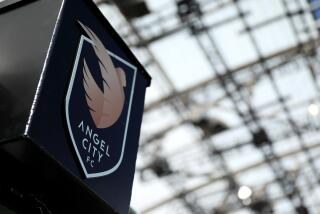Investor Hopes to Return Carl’s to Former Glory : Fast food: Leader of a group about to take over the chain cites ‘kinship’ with ousted chief Karcher.
- Share via
IRVINE — Over the last 10 years, William P. Foley II has turned a tiny Arizona storefront operation into the nation’s fifth-largest title insurance issuer. Now this no-nonsense former Air Force captain is hoping to work similar magic with the troubled Carl’s Jr. fast-food chain.
The leader of a group of nine Orange County investors--including the restaurant’s legendary founder, Carl N. Karcher--who expect to take effective control of the Anaheim-based chain by Friday, admits the task ahead is daunting. The regional chain has been pummeled by the marketing clout and discount pricing of giant national fast-food companies.
But Foley, 48, believes he brings the same spirit to the venture as the 76-year-old Karcher himself did when he started the chain in 1941 with a single hot dog stand in downtown Los Angeles.
“I do feel like I have a kinship with him,” Foley said, noting that both men used their energy and wits to build a huge business from scratch. In fact, Foley said he wants Karcher, deposed as the restaurant’s chairman in a messy boardroom battle two months ago, to assume a ceremonial leadership position atop the company and to actively work in a marketing role.
The Carl’s deal, which would give Foley’s investor group, allied with Karcher and his family, a 40% stake in the restaurant chain, is Foley’s latest and most ambitions effort to expand his business operations beyond his successful and respected Irvine-based title insurance company, Fidelity National Financial Inc. With only one exception, the other seven investors in Carl’s have ties to Fidelity National.
According to title industry analysts, Foley has a “hands-on” management style that leaves little to chance and operates with a minimum of bureaucracy between the executive suite and its 4,700 workers scattered throughout 48 states.
“There’s no room for comparison in my book,” John O’Neil, a title insurance analyst at Oppenheimer & Co. brokerage in New York, said in an interview earlier this year. “These guys are the best.”
A native Texan, Foley is an avid golfer who has maintained the trim physique of his college days at the U.S. Military Academy at West Point, N.Y.
After earning a master’s degree in business administration at Seattle University and a law degree at the University of Washington, Foley practiced real estate and tax law for several years in Phoenix. While there, he became a major investor in Security Savings & Loan in Scottsdale.
In 1981, Foley joined the thrift and directed its purchase of a tiny Tucson title insurance agency and a similar operation in Denver. Foley reasoned that the new businesses would funnel real estate and mortgage customers to the S&L.; Over the next several years, the thrift purchased several more small title companies, primarily in California.
At the end of 1984, Foley and a colleague, Frank P. Willey, engineered a leveraged buyout of the S&L;’s title insurance operations. Three years later, they moved Fidelity National to Irvine and took it public.
A year later, Foley made his first attempt to expand, buying a small stake in General Housewares, a gift and kitchen company in Stamford, Conn. But the investment was quickly sold--at a profit--when Foley’s intentions were questioned.
In 1989, just a year later, Foley tried to increase Fidelity National’s operation, this time buying nearly 25% of the Hammond Co., a regional mortgage broker in Newport Beach. But when Foley couldn’t acquire the entire company, he sold back his interest.
Barely 12 months later, Foley was at it again. This time he agreed to form a joint venture mortgage banking operation with Charter Savings Bank in Huntington Beach. The thrift, however, was ailing, and when federal regulators seized it, they killed the proposed venture.
The proposed deal for Carl’s is a complicated transaction that would transfer 3.9 million shares of Karcher Enterprises stock to a limited partnership directed by Foley. Karcher would have a 15% stake in the partnership.
Karcher, Foley and other investors signed a letter of intent Friday to form the partnership, which includes James Cavaricci, a Los Angeles garment manufacturer, and Daniel (Ron) Lane, who earlier and separately amassed 650,000 Karcher Enterprises shares by helping Karcher deal with a defaulted $4.8-million personal loan.
Foley and Lane are seeking seats on the board of Karcher Enterprises. Foley said he also wants to add an as-yet unnamed fast-food industry executive to the board. Foley acknowledged that his plans have already met with resistance from directors.
“The directors haven’t agreed to put Lane and me on the board yet,” Foley acknowledged. “And they’ve been uncooperative on Karcher becoming chairman emeritus (a largely ceremonial position atop the company).”
Foley expressed confidence in Carl’s current management, describing President Donald E. Doyle, a former Kentucky Fried Chicken executive, as a talented businessman. He praised Doyle’s efforts to cut costs and to experiment with a bargain-priced menu designed to compete with such market leaders as Taco Bell.
Doyle’s cost cutting has helped the company earn more money. But same-store sales--business at outlets open more than a year--have been falling for more than three years, indicating the chain is slipping.
Although Foley would like to see Carl’s expand regionally and perhaps nationwide, he said the chain must increase sales at its existing outlets before trying to grow.
As for Karcher’s future role in the company he started on the streets of Los Angeles, Foley said: “I feel for him. But that doesn’t mean I’m in favor of his assuming a management role. . . . He has good ideas and can play a role in marketing.”
More to Read
Inside the business of entertainment
The Wide Shot brings you news, analysis and insights on everything from streaming wars to production — and what it all means for the future.
You may occasionally receive promotional content from the Los Angeles Times.










